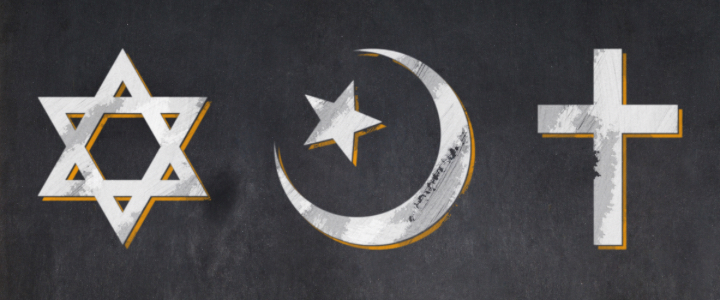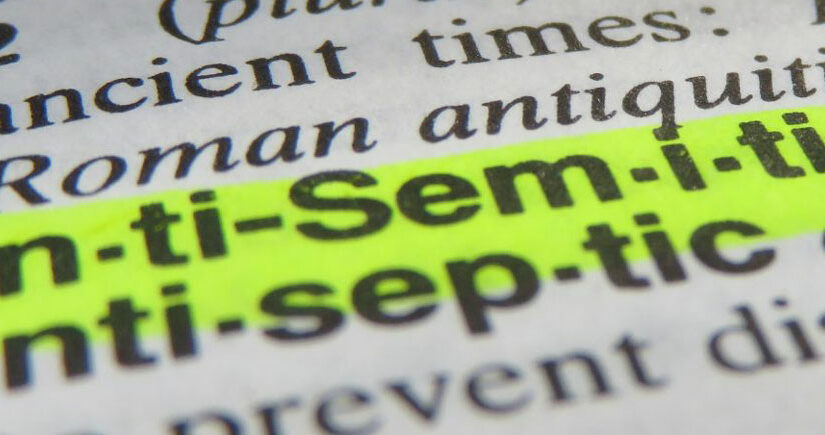
My Neighbor’s Faith: Exploring Narratives of Encounter, Challenge, and Growth Across Differences
Program: Hebrew College Me’ah Select
Instructor: Rabbi Or Rose (Read Bio)
Dates: 6 Thursdays, 4/11, 4/18, 5/2, 5/16, 5/23 & 5/30
Time: 7-9 p.m. Eastern
Course fee: $270, financial aid is available
Location: Hybrid – In Person at Hebrew College with Online option via Zoom
Hosted by: Hebrew College
This course is generously underwritten by The Rita J. And Stanley H. Kaplan Foundation in memory of Paul Alan Kaplan z”l.
Based on the 2012 award-winning collection by the same name (and including materials from the 2023 follow-up volume, With the Best of Intentions), this course offers students the opportunity to explore narratives of transformative encounter across lines of difference. With wisdom, wit, courage, and humility, the writers—Jewish, Christian, Muslim, Hindu, Buddhist, etc.—share their experience of border-crossing and the lessons learned from their interreligious and cross-cultural adventures. We live in one of the most religiously diverse society in the history of humankind. Every day, people of different beliefs, ideals, and practices encounter one another in a myriad of settings. How has this new situation of widespread diversity impacted the way we understand the religious other, ourselves, and God (or ultimacy)? Can we learn to live together with mutual respect, working together for the creation of a more compassionate, just, and sustainable world?
For more information, contact meah@hebrewcollege.edu

The Ethics of War and the Pursuit of Peace in Jewish Law and Thought – Online via Zoom
Program: Hebrew College Me’ah Select
Instructor: Rabbi Benjamin Samuels (Read Bio)
Dates: 10 Mondays, Winter/Spring 2024: 2/5, 2/12, 2/26, 3/4, 3/11, 3/18, 3/25, 4/1, 4/8 & 4/15
Time: 9:30 – 11:30 a.m.
Course fee: $450, financial aid is available
Location: Zoom
Hosted by: Temple Beth Elohim
Jews say hello and goodbye with the word “Shalom – Peace.” Our ultimate prayers (think “Sim Shalom” or the last line of Kaddish, “Oseh Shalom Bimromav”) are likewise blessings for peace. And yet, in the unredeemed world of the Jewish past and present, Jews have had to contend with war, terrorism, and violent persecution. How does a people whose opening words and most ardent prayers are for peace defend themselves from persecution, deal with terrorism, and wage war? Jewish tradition has a rich tradition of considering and debating the ethics of self-defense and the morality of war. These existential issues have become particularly pertinent for the Modern State of Israel in its 75 years of terror-and-war-filled history. In this course, we will study Jewish ethics of war and the pursuit of peace from biblical times to the present in Jewish law and thought. The method of our text-based learning will be to focus on ethical dilemmas born of past Jewish historical circumstances, learn related Jewish views from biblical and rabbinic literature, along with medieval and modern Jewish commentary, and robustly and respectfully discuss their moral applications and historical outcomes.
Note: This course will also be offered In-Person at Temple Beth Elohim in Wellesley on Wednesday mornings, 9:30-11:30 a.m. on the following dates: 2/7, 2/14, 2/28, 3/6, 3/13, 3/20, 3/27, 4/3, 4/10 & 4/17. Click here to register for this In-Person class.
For more information, contact meah@hebrewcollege.edu

From Buffalo to Jerusalem:
An In-Depth Look at
the History of American Zionism
In-Person at Hebrew College
Program: Hebrew College Me’ah Select
Instructor: Rabbi Dan Judson (Read Bio)
Dates: 7 Mondays, Winter/Spring 2024: 3/25, 4/1, 4/8, 5/6, 5/13, 5/20 & 6/3
Time: 9:30 – 11 a.m.
Course fee: $315, financial aid is available
Location: Zoom
Hosted by: Hebrew College
In evaluating the complicated and varied responses the American Jewish community had to the terrorist attack by Hamas and subsequent Israeli actions, it is worth taking a historical step back and tracing the history of American Zionism. Beginning with a look at 19th century American views of the Holy Land and moving through to the present day, we will examine the Jewish community’s sometimes fractious, sometimes unified approach to Zionism. With the aid of new research and books like Walter Russel Mead’s The Arc of a Covenant: The United States, Israel and the Fate of the Jewish People, we will be paying particular attention to the way that non-Jewish Americans have been as essential to the unfolding story of American Zionism as the Jewish community.
This course is first and foremost a history course, we will examine Louis Brandeis’s centrality to the Zionist movement, the first time America goes on record with support for Zionism, the politics around Truman’s recognition of Israel, and all manner of episodes relating to the development of American Zionism. The course, however, is primarily not going to be an opportunity to discuss the current situation, while the present day will never be far from our minds (how could it be), this course is for people who want a background in how America came to this place.
Note: This course will also be offered Online at Hebrew College on Monday evenings, 7:30-9 p.m. on the following dates: 1/29, 2/5, 2/12, 2/26, 3/4, 3/11 & 3/18. Click here to register for this Online class.
For more information, contact meah@hebrewcollege.edu

The Newest Forms of
the Oldest Hatred:
Understanding Contemporary Antisemitism
Program: Hebrew College Me’ah Select
Instructor: Dr. Jacob Meskin (Read Bio)
Dates: 6 Tuesdays -1/23, 1/30, 2/6, 2/13, 2/20 & 2/27
Time: 10 a.m. – 12 p.m.
Course fee: $270, financial aid is available
Location: Zoom
Hosted by: Kerem Shalom, Concord
A number of dangerous forms of antisemitism are poisoning our world. Where did they come from? How did they arise? And based on that, what can we do to counter them?
In this course we will first explore the ancient and medieval historical contexts of Christian and Islamic anti-Judaism, out of which modern forms of antisemitism have arisen. We will then turn to the nineteenth century, which saw decisive reinterpretations of these earlier materials in both Christian and Islamic theological circles.
We will however spend the bulk of our time analyzing precisely how subsequent movements in the twentieth and twenty-first centuries helped to spawn the notorious and vicious manifestations of antisemitism we encounter today. A short list of these manifestations would include various forms of contemporary Islamic antisemitism; total denial of legitimacy to Zionism and thus of the right of Jews to have a majority nation state of their own; radical right-wing and radical left-wing hatred of Jews and Judaism; different forms of online antisemitism, and the horrifying absolute enshrinement of antisemitism as dogmatic truth among academics and on college campuses, particularly though not exclusively in America.
We will conclude by studying groups who are, happily, opposed to these terrible and dangerous slanders, and by pondering some proposed strategies for responding to them.

The Ethics of War and the Pursuit of Peace in Jewish Law and Thought – In Person at Temple Beth Elohim, Wellesley
Program: Hebrew College Me’ah Select
Instructor: Rabbi Benjamin Samuels (Read Bio)
Dates: 10 Wednesdays, Winter/Spring 2024: 2/7, 2/14, 2/28, 3/6, 3/13, 3/20, 3/27, 4/3, 4/10 & 4/17
Time: 9:30 – 11:30 a.m.
Course fee: $450, financial aid is available
Location: In Person at Temple Beth Elohim, Wellesley
Hosted by: Temple Beth Elohim
Jews say hello and goodbye with the word “Shalom – Peace.” Our ultimate prayers (think “Sim Shalom” or the last line of Kaddish, “Oseh Shalom Bimromav”) are likewise blessings for peace. And yet, in the unredeemed world of the Jewish past and present, Jews have had to contend with war, terrorism, and violent persecution. How does a people whose opening words and most ardent prayers are for peace defend themselves from persecution, deal with terrorism, and wage war? Jewish tradition has a rich tradition of considering and debating the ethics of self-defense and the morality of war. These existential issues have become particularly pertinent for the Modern State of Israel in its 75 years of terror-and-war-filled history. In this course, we will study Jewish ethics of war and the pursuit of peace from biblical times to the present in Jewish law and thought. The method of our text-based learning will be to focus on ethical dilemmas born of past Jewish historical circumstances, learn related Jewish views from biblical and rabbinic literature, along with medieval and modern Jewish commentary, and robustly and respectfully discuss their moral applications and historical outcomes.
Note: This course will also be offered Online via Zoom on Monday mornings, 9:30-11:30 a.m. on the following dates: 2/5, 2/12, 2/26, 3/4, 3/11, 3/18, 3/25, 4/1, 4/8 & 4/15. Click here to register for this Online via Zoom class.
For more information, contact meah@hebrewcollege.edu

From Buffalo to Jerusalem:
An In-Depth Look at
the History of American Zionism
Online via Zoom
Program: Hebrew College Me’ah Select
Instructor: Rabbi Dan Judson (Read Bio)
Dates: 7 Mondays, Winter/Spring 2024: 1/29, 2/5, 2/12, 2/26, 3/4, 3/11 & 3/18
Time: 7:30-9 p.m.
Course fee: $315, financial aid is available
Location: Zoom
Hosted by: Hebrew College
In evaluating the complicated and varied responses the American Jewish community had to the terrorist attack by Hamas and subsequent Israeli actions, it is worth taking a historical step back and tracing the history of American Zionism. Beginning with a look at 19th century American views of the Holy Land and moving through to the present day, we will examine the Jewish community’s sometimes fractious, sometimes unified approach to Zionism. With the aid of new research and books like Walter Russel Mead’s The Arc of a Covenant: The United States, Israel and the Fate of the Jewish People, we will be paying particular attention to the way that non-Jewish Americans have been as essential to the unfolding story of American Zionism as the Jewish community.
This course is first and foremost a history course, we will examine Louis Brandeis’s centrality to the Zionist movement, the first time America goes on record with support for Zionism, the politics around Truman’s recognition of Israel, and all manner of episodes relating to the development of American Zionism. The course, however, is primarily not going to be an opportunity to discuss the current situation, while the present day will never be far from our minds (how could it be), this course is for people who want a background in how America came to this place.
Note: This course will also be offered In-Person at Hebrew College on Monday mornings, 9:30-11 a.m. on the following dates: 3/25, 4/1, 4/8, 4/15, 5/6, 5/13 & 5/20. Click here to register for this In-Person class.
For more information, contact meah@hebrewcollege.edu







